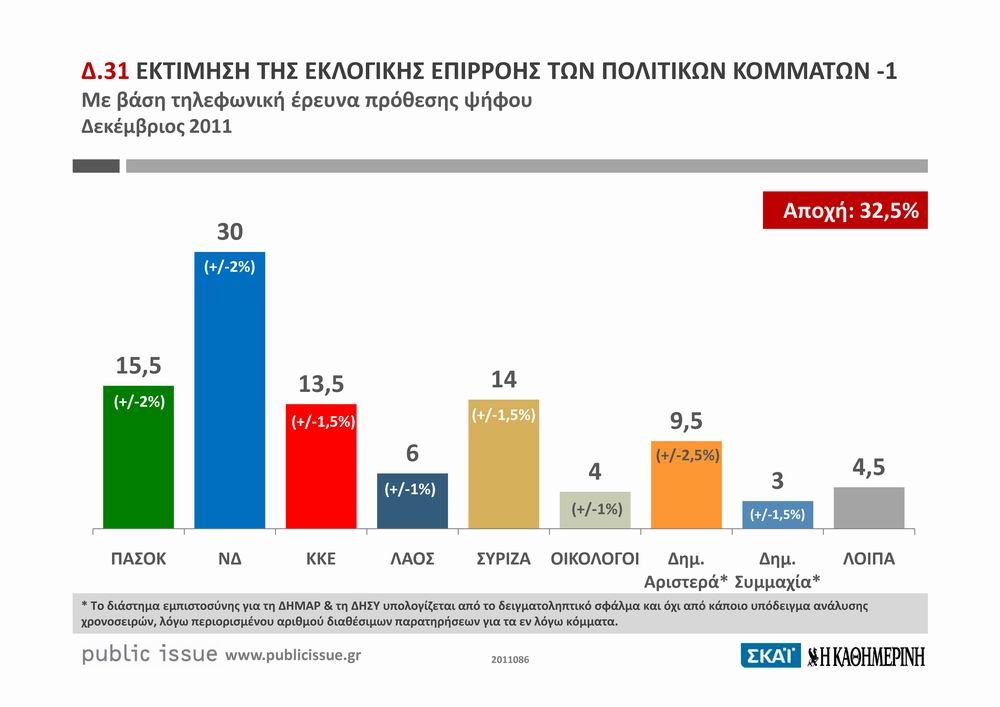The latest opinion poll published by the Greek newspaper Kathimerini shows a further collapse for PASOK and a significant increase for the parties to its left. This underlines the need for a united front of the left parties as an alternative to the capitalist austerity cuts.
 Kathimerini poll
Kathimerini poll
The Public Issue opinion poll, commissioned by the Kathimerini newspaper and Skai TV and published on December 9, gives the right wing New Democracy a slight increase of 1.5 percentage points since November to 30% (still below the 33.5% it got in the 2009 elections). On the basis of this result, ND would not be able to form a government on its own and it would need to enter a coalition with other forces, showing the weak basis for right wing bourgeois policies in Greece right now.
The extreme right wing LAOS loses 2.5 points and would only get 6%. Its participation in the austerity coalition government of Papadimos has clearly exposed its populist rhetoric amongst some of its voters.
PASOK continues its collapse in opinion polls losing another 4 points which reduces it to only 15.5% of the votes (from nearly 44% it got in the 2009 elections).
The most significant point to stress in the opinion poll is the significant increase for all the parties to the left of PASOK. Syriza (the Coalition of Radical Left led by Synaspismos) would become the third largest party with 14% (up 2 points since November and nearly 10 points since its 4.6% vote in the 2009 elections). The Communist Party KKE also wins 2.5 points and would get 13.5% of the votes (up from 7.5% in the 2009 elections). To this we have to add that the Democratic Left (a right wing split from Synaspismos in 2010) would receive 9.5% (an increase of 2 points since November). These three parties put together would therefore get 37% of the votes.
This only underlines the point made by the Greek Marxist tendency around the Marxistiki Foni paper about the need for a united front between KKE and Syriza on the basis of a clear anti-capitalist program against austerity measures, for the repudiation of the debt and the nationalisation of the key sectors of the economy. Such a united front would not only get the combined vote of the two parties, but by appearing to be a serious alternative to the current coalition government, its impact would be even wider. It would have the effect of attracting even more amongst the workers who form the electoral base of PASOK, particularly amongst the PASKE trade unionists which have broken links with the party . Such a united front on a clear program of breaking with austerity policies, combined with united mobilisation in the streets, would also force the Democratic Left to take a clear position in relation to austerity policies or lose its base of support.
The poll also revealed that although the personal popularity of Papadimos is still high (60%) the majority of the population (53%) have little or no confidence that he will be able to solve the problems of the economy. Only 15% of the population are satisfied with the government.
Meanwhile, economic data released yesterday showed a further deterioration of the Greek economy. "The annual pace of contraction in industrial output accelerated from a 1.7 percent drop in September, contracting 12.3 percent in October. Manufacturing production also declined 11.9 percent." To the massive contraction of the Greek economy, aggravated by austerity measures, we have to add the worsening economic situation in Greece's export markets in Europe. "The big drop in the October industrial output year-on-year reading reflects depressed domestic demand and slowing export activity due to weakening conditions in main trading partners,» said EFG Eurobank economist Platon Monokroussos.
Youth unemployment has now reached46.4 percent, up from 43.5 percent in August.
In just one example of the human cost of making workers pay for the capitalist crisis, the daily Eleftherotypia reported on December 5 that public hospitals were refusing to admit pregnant women about to give birth if they could not pay in advance. Under the so-called "medical care unified system", introduced in November 2011, patients must pay for the cost of childbirth in advance, and only later they are able to collect the childbirth allowance. Scandalously, according the Ministry of Health price list a normal birth costs 950 euro, while a cesarean section costs 1,500 euro. But the childbirth allowance is only 600 euro leaving a gap of between 350 and 900 euro that pregnant women have to pay themselves. (More details about this particular case in this report from Keeptalkinggreece blog)
